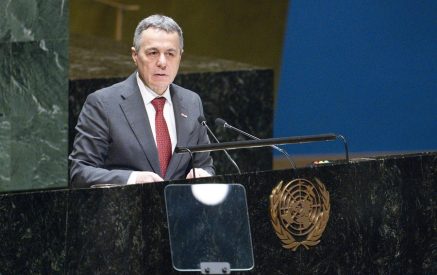COPENHAGEN, 29 April 2020 – As COVID-19 continues spreading quickly in many jails and prisons, some countries are releasing inmates on humanitarian grounds, a move welcomed today by leaders of the OSCE Parliamentary Assembly’s human rights committee. The parliamentarians echoed calls by United Nations officials and the World Health Organization for governments to drastically reduce prison populations.
Each OSCE country should find an effective approach to upholding criminal justice and promoting public health, the PA members said, stressing that societies should not forget those behind bars. Protecting inmates and guards from COVID-19 may require early or provisional release of prisoners to relieve overcrowding, the OSCE parliamentarians said.
“Social distancing is not an option in overcrowded jails and prisons, which makes them among the most dangerous places to be during an outbreak,” said Kyriakos Hadjiyianni (MP, Cyprus), Chair of the PA’s Committee on Democracy, Human Rights and Humanitarian Questions. “The prison systems of many OSCE countries are over capacity, and so for the sake of the health of both prisoners and prison workers, I urge authorities to explore options for releasing those who are not considered a threat to public safety.”
Committee Vice-Chair Michael Georg Link (MP, Germany) called attention to the plight of those awaiting trial. “In some countries, trials and court hearings have been delayed or canceled to help stop the spread of the coronavirus, but this means that many people are now in custody who are denied their basic due process rights,” he said. “No one should be needlessly exposed to a deadly virus without even having a day in court. An arrest should not be a death sentence.”
Read also
“Health services and sanitation are inadequate in many detention facilities,” Committee Rapporteur Kari Henriksen (MP, Norway) pointed out. “To expose people to deadly pathogens without proper protection is inhumane and irresponsible. This is even more true when we are talking about people who have not been convicted of a crime, or those who are elderly and pose no threat to society, or those who are serving sentences for petty offences.”
Hadjiyianni, Link and Henriksen urged authorities to prioritize the release of vulnerable detainees, notably those over the age of 60, pregnant women, those with underlying health conditions, as well as people awaiting trial for nonviolent offences or with imminent release dates.
They welcomed the steps taken by some governments to ease overcrowding in jails and protect detainees from the coronavirus, but noted that more action is needed, particularly in terms of taking proactive steps to protect inmates and guards from infection. They highlighted the humanitarian assistance recently provided by the OSCE to penal institutions in Uzbekistan as an example of a good practice that can be replicated in other OSCE countries.
The OSCE PA human rights leaders also reiterated the call earlier this month by OSCE Parliamentary Assembly Vice-President and Acting Chair of the Ad Hoc Committee on Migration Margareta Cederfelt (MP, Sweden) who highlighted the deplorable conditions that many migrants and refugees face in camps and detention facilities across the OSCE area.
Cederfelt stressed that one of the most critical steps that can be taken to reduce the spread of COVID-19 is to relieve overcrowding in migrant detention facilities.
OSCE PA





























































